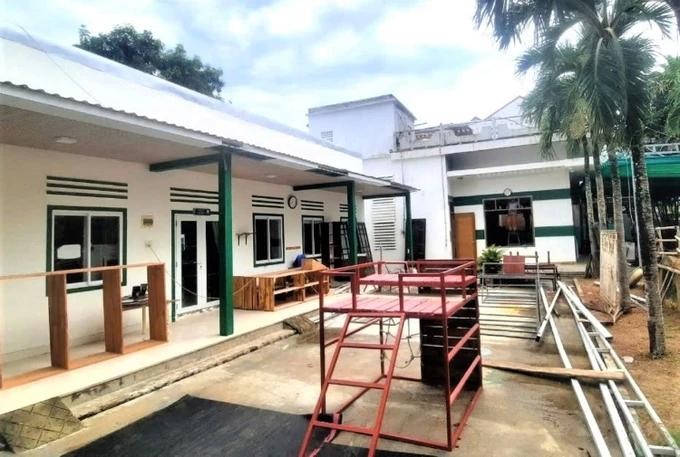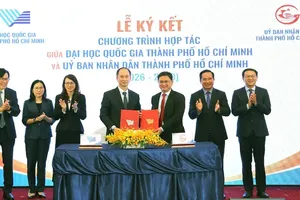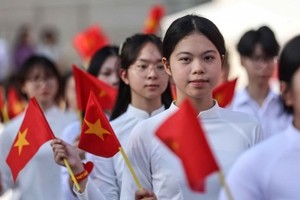
If investors lack a long-term vision and focus solely on short-term profits, the consequences can be unpredictable, akin to squeezing a lemon without considering the peel.
A father in Ho Chi Minh City’s District 1 shared that his three children attend American International School Vietnam (AISVN). Among them, two have already graduated, and one is currently in 7th grade. The children’s education is financed through a loan agreement totaling US$280,000 (approximately VND7 billion); the man still keeps all necessary documentation of the loan agreement between him and the school. The contract explicitly states that the school does not charge tuition fees while students are enrolled. After graduation, the school commits to refunding the capital within 30 days.
However, it has been three years, and the school repeatedly promised to repay the borrowed money. There are many cases where schools borrow funds through capital mobilization similar to the man. As of now, none of them have fulfilled the capital repayment commitment as stated in the contract.
The circumstances at AISVN are not isolated. Previously, numerous parents of students enrolled at International Elementary-High School Choi Xanh in Hoi An City of Quang Nam Province were taken aback when they received an email from Catherine Clare Mckinley, a 52-year-old British national and the authorized operator of the school. The message informed them that all students had been moved to American International School APU Da Nang, following the school's admissions process and the collection of tuition fees exceeding VND14 billion.
The announcement indicated that Mckinley is no longer overseeing the school. Nevertheless, American International School APU Da Nang has refused to accept students from International Elementary-High School Choi Xanh, situated in Hoi An City, Quang Nam province, citing the non-receipt of tuition fees from parents as the reason. This conflicting information has caused concern among parents, leading them to unite in filing complaints with law enforcement about the potential misappropriation of tuition fees.
A former official from the Ministry of Education and Training (MoET) has indicated that the practice of capital mobilization in private secondary schools is widespread and has been ongoing for an extended period. This process typically involves arrangements made between parents and educational institutions; however, it poses significant risks that could result in failure if the funds raised are redirected toward other investments.
The tuition fee details for the 2024-2025 academic year at 83 private high schools, including those with international programs, in Ho Chi Minh City have sparked significant concern among parents. A majority of these institutions have raised their fees compared to the previous year.
Notably, some schools impose particularly high charges, such as North American International School at VND59.6 million per student monthly, Nam Uc School VND 55.1 million per student monthly, and Tesla School at VND53 million per student monthly. This raises a question about the maximum allowable increase in tuition fees for private schools.
Mr. Tran Khac Huy, who serves as the Head of the Financial Planning Division at the Ho Chi Minh City Department of Education and Training, stated that private schools are permitted to raise tuition fees and other educational service charges at the start of each academic year. However, these increases must remain within the maximum limits established by regulatory bodies.
Should any institution increase tuition fees by over 10 percent or raise service fees or educational support costs by more than 15 percent compared to the previous academic year, the Department will issue notifications to them requiring adjustments to ensure compliance with the regulations.
Tuition fees and service charges at private educational institutions are established through agreements made with the parents of students. The Department of Education and Training lacks the authority to influence the fee structures set by these schools directly. The Department is responsible for overseeing whether the annual increases surpass the designated limits. The yearly assessment of operational conditions is focused on determining enrollment goals, rather than regulating the fee increase patterns of private schools.
Investors of private educational institutions have full authority to set staff and teacher salaries, establish tuition fees, and determine investment strategies for physical facilities. As a result, when an owner focuses on maximizing profit, they may engage in questionable practices, such as the unethical exchange of degrees, to enhance revenue.
Between October 2018 and April 2022, a 33-year-old resident of Thanh Loc Ward in District 12, Ho Chi Minh City, founded several organizations. These include Truong Son Human Resources Company Limited, Truong Son Economics and Technology School, Saigon Economics and Technology Company Limited, Saigon Economics and Technology School, and Saigon Technical Inspection Center in Quang Ngai Province.
Additionally, the man also established Viet RDC Education Joint Stock Company, Southern Economics and Technology School, and the Southern Technical Inspection Center in Binh Duong Province, appointing various individuals to be vice principals and staff.
These entities did not organize training or examinations as required by regulations but sold vocational certificates. The man and many individuals signed, issued, and sold 14,268 certificates from Truong Son Economics and Technology School, 8,351 certificates from Southern Economics and Technology School, and a large number of certificates from Saigon Economics and Technology School, as well as many labor safety cards from Southern Technical Inspection Center without any training or examination, illegally profiting over VND6.2 billion. In this case, 69 individuals were sentenced by the court to between 16 months and 20 years in prison.
The incident involving Dong Do University, which issued 429 fraudulent English language diplomas resulting in over VND7.1 billion in illicit profits, serves as a significant cautionary tale for investors. Between late 2017 and early 2018, Chairman Tran Khac Hung of the Board of Management orchestrated multiple meetings with the board of directors, training departments, and finance departments to advocate for a policy that allowed the issuance of diplomas without proper enrollment or training.
Consequently, the chairman absconded, and both the university president and other implicated individuals found themselves embroiled in legal challenges, facing penalties that ranged from 12 months of probation to 12 years of imprisonment.
Prior to his prosecution and temporary detention by law enforcement for the crime of "Fraudulent appropriation of property," Nguyen Ngoc Thuy, a 42-year-old resident of Hanoi, served as the Chairman of EGroup Corporation and the General Director of Apax English Joint Stock Company (Apax Leaders). He was well-known in the business community for his remarkable journey of leaving university and establishing a trillion-dollar corporation from the ground up.
In 2015, Apax Leaders made its official entry into the English language teaching sector in Vietnam, rapidly establishing itself as a leader by employing exclusively foreign instructors and effectively integrating technology into its programs. At the height of its success, the organization boasted a network of 130 ESL and IELTS centers across over 32 provinces and cities, serving tens of thousands of students. However, following the onset of the Covid-19 pandemic, the company has faced numerous center closures and has been involved in a controversy regarding unpaid tuition fees owed to parents across the country.
In mid-March 2024, the Ho Chi Minh City Department of Education and Training required Apax leaders to refund a total of approximately VND108 billion to parents in Ho Chi Minh City. The organization has already returned VND14.2 billion leaving a remaining debt of VND93.8 billion. Apax leaders proposed to repay this debt in 2025, distributing quarterly payments of VND4 billion to parents until completion, with any outstanding balance carried over to the following year. However, according to feedback from parents, the debt recovery process is prolonged, and they are uncertain when they will receive the refunded tuition fees.
Professor Dr. Tran Xuan Nhi, former Deputy Minister of Education and Training, observed that numerous education investors have significantly increased their wealth through their ventures in the education sector. The main source of funding for schools is derived from the tuition fees collected from students. Some universities that initially invested only a few hundred million dong in facility rentals have now seen their assets soar to trillions of dong.
It is crucial to make clear that the money in question comes from the school's operating activities as well as contributions from students, teachers, and other stakeholders. It does not come from the owner of the school's personal funds. Therefore, it is imperative that investors in education demonstrate their social duty by enacting just tuition cost structures, providing financial aid to students from disadvantaged backgrounds, and advocating for equal access to education for all students.
Currently, some universities and colleges also require students to pay a deposit when they are admitted through early admission methods. According to a man in Di An City of the Southern province of Binh Duong, FPT University has recently sent a notification informing him that his child had been directly admitted and was exempt from tuition fees.
The admission notification also contained a request for parents to submit a deposit of 5 million dong. Similarly, a man in District 3 in Ho Chi Minh City mentioned that his child applied for the Information Technology program based on their academic achievements and received an admission notification that included a request for the same VND5 million in deposit.
























